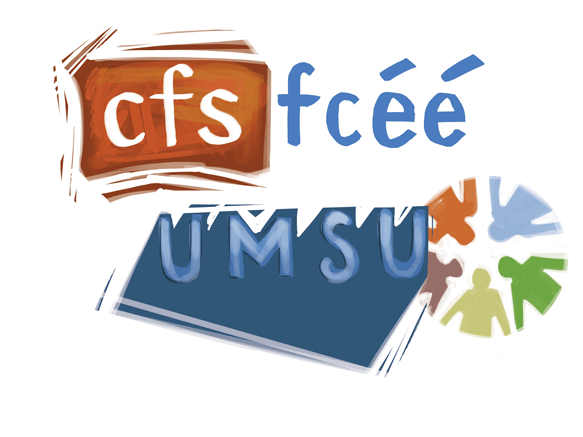UMSU president Jakob Sanderson recommended that the union vote to remove itself from the Canadian Federation of Students during Thursday’s board meeting.
An emergency board meeting is scheduled for Nov. 29 when board members will vote on whether to affirm membership. Should the board vote to not affirm, a referendum process will begin.
“I will be voting, and the rest of my executives will be voting against affirming affirmation,” Sanderson said.
It is the executive’s recommendation that UMSU continue its membership in the Undergraduates of Canadian Research-Intensive Universities (UCRU) and become a member of the Canadian Alliance of Student Associations (CASA), two different student groups operating in Canada.
During a presentation reporting on the federation’s annual general meeting (AGM) that occurred from Nov. 16 to 19 in Gatineau, Que., Sanderson spoke to both the pros and cons of remaining a member of the federation.
Supporting defederation, Sanderson said UMSU’s size and scope allows it to “offer services of the same or higher quality for the same or lower cost than the [Canadian Federation of Students] in a number of fields.”
He added that the executive was not being fairly represented in the federation’s lobbying efforts.
Sanderson also listed services the Canadian Federation of Students offers, saying “there are many that we don’t use, but some that we do,” noting the International Student Identification Card and the free access to the UFile tax service, as examples.
“UMSU delegates, particularly the executives, are still not treated as welcome members in the space when communicating with the federation,” he said.
“And we are targeted when we do not participate to the satisfaction of some members.”
“A valid concern”
Sanderson did not campaign on leaving the federation when running for executive council earlier this year, and even advocated in support of the federation in the past — he and all of the current UMSU executives voted to stay with the federation in the plebiscite just eight months ago.
“I’ve been actively involved with the Canadian Federation of Students since my second year,” he said.
“And yet, when we got into our roles, we got the chance to interact more with the Canadian Federation of Students, go to national general meetings, what we saw was a lot of the concerns that past UMSU boards and past UMSU executives raised were quite correct.”
That plebiscite saw students vote in overwhelming support of staying with the Canadian Federation of Students, with a 64.6 per cent vote in favour of continued membership.
According to Sanderson, six consecutive UMSU executive teams have considered separating from the federation.
He said the worry that students may see the failed plebiscite and ensuing talks of defederation as evidence their voices are not being heard is “a valid concern,” but added many of the issues those executives raised remain credible.
The current executive has spoken critically of the federation in the past. In June, UMSU presented concerns with the federation after the semi-annual general meeting held that same month.
“Ultimately what we said was we’re not sure at this point that we’re getting the value for money with the Canadian Federation of Students, and we are questioning continued membership.”
Sanderson compared costs of other similar organizations, with the Canadian Federation of Students costing UMSU students $341,000, CASA costing $50,000 and UCRU being free of charge.
The federation has the largest number of member-student unions nationwide with 54. CASA has 22 and UCRU nine.
The federation is, however, the only organization that offers both advocacy and services. CASA and UCRU only provide advocacy resources. It is also the only organization that has a clear mandate advocating for free education tuition.
Critical response
Sanderson’s recommendation was met with criticism from some students who attended the meeting.
Chance Paupanekis, an executive representative of the federation’s Circle of First Nations, Métis and Inuit students who was present at the board meeting, said a referendum would be a waste of student funds.
“They preach continuously about financial mismanagement [at the Canadian Federation of Students level], yet they spend tens of thousands of dollars holding these plebiscites, holding these referendums, and the same results show every single time,” he said.
Sanderson said while he currently was not sure of the exact cost of a possible referendum, he believed the end goal of defederating from the federation would “save students quite a bit of money.”
Jack Theis, a member of the University of Manitoba Indigenous Students Association (UMISA) and American student said there is “nothing like the Canadian Federation of Students” in the U.S.
“After hearing about how the Canadian Federation of Students fights for low tuition costs or for free tuition, basically, that’s absolutely essential,” he said.
“Because if you all think for a second that if we stop fighting that Canada […] is not going to raise those prices? Then [you’re] sadly mistaken.”
What’s next?
Should the board vote to hold a referendum, a petition will be circulated to generate support. For the petition to be valid for review, 15 per cent of the student body must sign, or approximately 3,400 students.
While the emergency meeting will provide a decision on whether or not to affirm membership in the federation, Sanderson said this does not mean defederation is guaranteed.
“A board vote to leave the Canadian Federation of Students next week does not have us defederate from the Canadian Federation of Students,” he said. “This just gives us the chance to talk to students, to gather signatures from those that would like to leave the Canadian Federation of Students and demand a referendum.
“Ultimately, we will never leave the Canadian Federation of Students without a referendum of our entire student membership.”
The earliest feasible date for a referendum, according to Sanderson, would be fall 2019.


